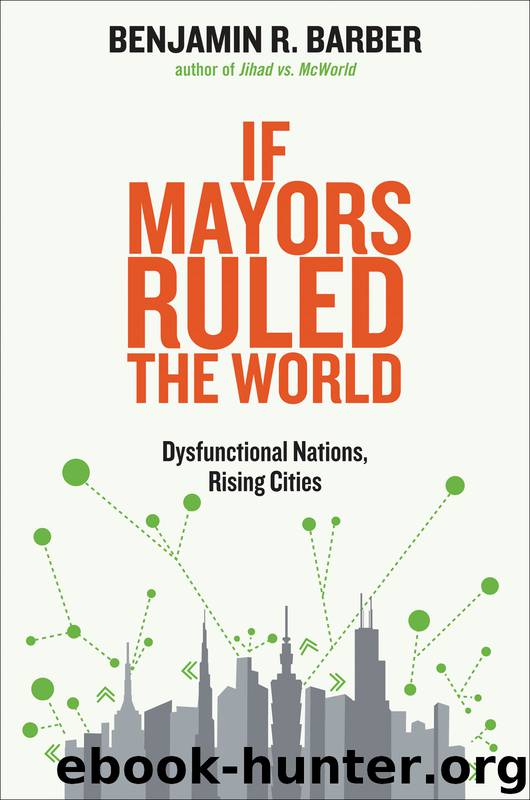If Mayors Ruled the World by Benjamin R. Barber

Author:Benjamin R. Barber
Language: eng
Format: epub
Publisher: Yale University Press
Published: 2013-04-07T04:00:00+00:00
Addressing Injustice: Democracy, Cure Thyself!
The remedy for the ills of democracy, Jefferson quipped, is more democracy. Citizen reformers have not waited for the collapse of capitalism or constitutional revisions to engage in direct action on behalf of social justice. Social movements, nonviolent actions, and civic protest are not just efforts at reforming democracy, they are democracy in action. A half century ago, Michael Harrington appealed for “a vast social movement, a new period of political creativity” to alleviate the poverty he had chronicled.19 In the same spirit, David Harvey writes today that “it will take imagination and political guts, a surge of revolutionary fervor and revolutionary change to construct a requisite poetics of understanding for our urbanized world, a charter for civilization, a trajectory for our species-being.”20 The poetics of understanding, however, risk pushing real change into a remote future and leaving behind all those who are paying the costs of inequality today, above all (always) poorer women and children. It is the virtue of social movements, however, that they favor mitigation now over revolutionary change in some remote future.21 By “pushing turbulence to its outer limits,” Frances Fox Piven reminds us, they can leave behind a “residue of reform” that helps catalyze real if modest change.22
Occupy Wall Street was another kind of social movement geared to the age of big money and big media; it too responded to a structural crisis (the global financial meltdown) but aimed at raising media and public consciousness of radical inequalities in countries of great wealth. With its mostly middle-class, youth-led protest gatherings, it initially seemed to aspire to engage in participatory democratic processes that demonstrated “what democracy looks like.” Yet it also engaged with unions and created encampments open to the homeless and unemployed, effectively trying to do in practice what it preached in theory. Although it eschewed conventional politics, it was overtaken by the 2012 American elections. Nonetheless, it too has left behind a residue of reform and a fresh understanding of democracy as more than just voting. This is not the place to render judgment on Occupy Wall Street.23 But it does have lessons for urban democratic activists, reminding them that social movements are important democratic tools and can affect both the media and the political system and also transform participants in the process.
Even normal democratic politics in the city helps to combat the bias against government and the public sector that has gripped national politics in the United States and the West. The three-decades-old assault on the public sector that has accompanied market fundamentalism has made the battle against inequality and injustice at every level of government more difficult.24 In the city, taking on the privatization ideology is both less practical (its causes lie well beyond the city in national political ideologies and divisive party principles) and yet also more doable because slurs against “big government” have less traction in municipal politics. The corrosive de-democratization in the political sphere that attends market fundamentalism nationally makes much less sense where government
Download
This site does not store any files on its server. We only index and link to content provided by other sites. Please contact the content providers to delete copyright contents if any and email us, we'll remove relevant links or contents immediately.
| Anthropology | Archaeology |
| Philosophy | Politics & Government |
| Social Sciences | Sociology |
| Women's Studies |
The Secret History by Donna Tartt(16696)
The Social Justice Warrior Handbook by Lisa De Pasquale(11501)
Thirteen Reasons Why by Jay Asher(7817)
This Is How You Lose Her by Junot Diaz(5812)
Weapons of Math Destruction by Cathy O'Neil(5064)
Zero to One by Peter Thiel(4848)
The Myth of the Strong Leader by Archie Brown(4801)
Promise Me, Dad by Joe Biden(4464)
Beartown by Fredrik Backman(4453)
How Democracies Die by Steven Levitsky & Daniel Ziblatt(4437)
Stone's Rules by Roger Stone(4430)
The Fire Next Time by James Baldwin(4358)
100 Deadly Skills by Clint Emerson(4098)
A Higher Loyalty: Truth, Lies, and Leadership by James Comey(4047)
Rise and Kill First by Ronen Bergman(4032)
The David Icke Guide to the Global Conspiracy (and how to end it) by David Icke(3902)
The Farm by Tom Rob Smith(3887)
Secrecy World by Jake Bernstein(3796)
The Doomsday Machine by Daniel Ellsberg(3744)
